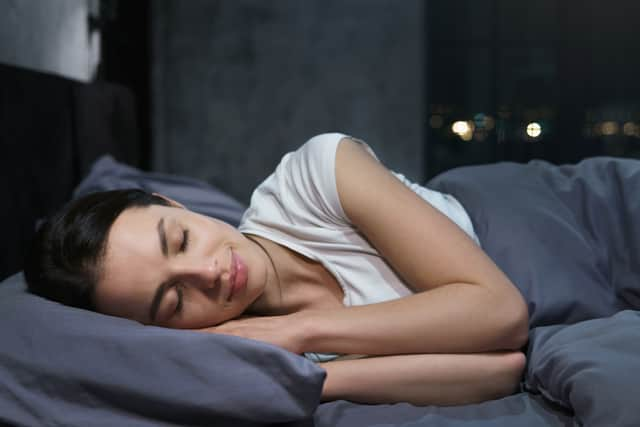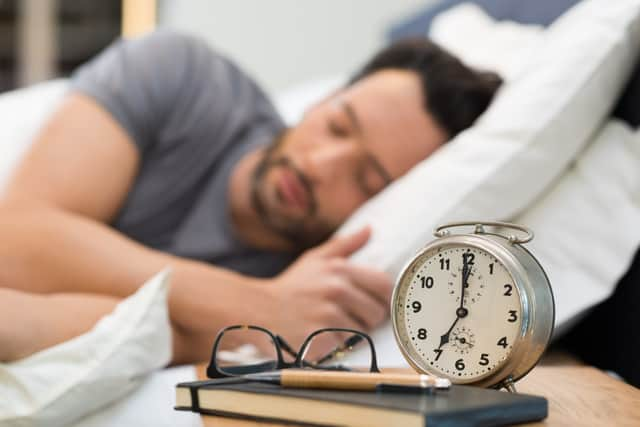World Sleep Day 2022: when is it, what is this year’s theme, how to take part and get a better night’s sleep
This article contains affiliate links. We may earn a small commission on items purchased through this article, but that does not affect our editorial judgement.
and live on Freeview channel 276
World Sleep Day was created as a celebration of sleep, and a call to action on sleep health and how it can affect you physically, mentally and emotionally.
We could all do with an improved night’s sleep, so here’s everything you need to know, as well as some expert tips on catching some zzz’s.
Advertisement
Hide AdAdvertisement
Hide AdWhat is World Sleep Day?
World Sleep Day is an annual awareness event, which was initially created by a small group of healthcare providers that specialised in sleep medicine and research.
The professionals believed that sleep was not being considered a priority when it came to personal health and wellbeing.


The day itself is hosted by the World Sleep Society (WSS), which is a non-profit from the United States.
The goal and purpose of the World Sleep Society is to advance and distribute knowledge about sleep, circadian rhythms, sleep health, and sleep disorders across the world.
Advertisement
Hide AdAdvertisement
Hide AdWhen is World Sleep Day?
World Sleep Day is held on the Friday before the Spring Vernal Equinox each year, so for 2022 it will be celebrated on Friday 18 March.
The slogan and theme for this year is “Quality Sleep, Sound Mind, Happy World”. This theme focuses on the discussion of how quality sleep can help to maintain mental health.
World Sleep Day events and activities are free to the public, and sponsors provide the necessary funds to the World Sleep Society as a way in which to reimburse the costs - this includes the creation of educational content.
This year, delegate, Dr Jill McGarry, a Chartered Clinical Psychologist, will be hosting a one hour virtual sleep educational talk for the NHS trust. You can also get involved via the event website.
Advertisement
Hide AdAdvertisement
Hide AdHealthy sleep is sleep in which restores and energises a person, so that they feel wide-awake, dynamic and energetic all day long.
On the other hand, sleep disorders are common, and they can cause serious problems, if left untreated. Examples of such disorders include Insomnia and sleep apnea.
Insomnia is defined as difficulties to fall and stay asleep, and sleep apnea is a common breathing disorder - which also involves other factors such as snoring.


So, how do you get a good night’s sleep?
Here are some expert tips…
Find time to relax
Take a warm bath or shower, as it will help your body reach an ideal temperature for sleep. Studies show that taking a warm bath 90 minutes before bed doesn’t just improve sleep quality, it also allows for deeper sleep. This time of the day needs to be about winding down, and a guided meditation, or breathwork can be all you need to relax your mind before you attempt to sleep. Reading a book is also a calming option that can help you get into that sleep-mode.
Avoid technology
Advertisement
Hide AdAdvertisement
Hide AdPowering down and avoiding technology for an hour or so before bed is beneficial for a good night’s rest. Smartphones, computers and TVs all emit a blue light, which has a negative effect on sleep quality. The exposure to this blue light suppresses the production of melatonin, which is a hormone that induces sleepiness. During the day this can be an advantage to keep you alert, but at night it can have a serious impact on your sleep.
Caffeine consumption
Try to avoid consuming caffeine later in the day. Drinking coffee after 3pm isn’t recommended as it will most likely disrupt your sleep. Even small amounts found in chocolate or painkillers can be enough to have an effect. Caffeine is a central nervous system stimulator, and reduces total sleep time and sleep efficiency - it can also worsen perceived sleep quality.
Consistency of sleep
The recommended amount of sleep for an adult is at least seven hours a night. If you can stick to going to bed and getting up at the same time every day, the consistency reinforces your body’s sleep cycle. Regularity is important for stabilising your internal biological clock, allowing you to fall asleep and maintain uninterrupted sleep.
Regular exercise
Physical exercise during the day is an effective approach to make you drift off quicker, and have better quality sleep. Relaxation exercises such as yoga are known to relax muscles and have a calming effect. Going for a walk is one of the best forms of exercise that can benefit your sleep, as it will increase your exposure to natural light. This bright, natural light during the day will help you keep your circadian rhythm healthy - which in turn will also have a positive effect on your mental health.
A message from the editor:
Advertisement
Hide AdAdvertisement
Hide AdThank you for reading. NationalWorld is a new national news brand, produced by a team of journalists, editors, video producers and designers who live and work across the UK. Find out more about who’s who in the team, and our editorial values. We want to start a community among our readers, so please follow us on Facebook, Twitter and Instagram, and keep the conversation going. You can also sign up to our email newsletters and get a curated selection of our best reads to your inbox every day.
Comment Guidelines
National World encourages reader discussion on our stories. User feedback, insights and back-and-forth exchanges add a rich layer of context to reporting. Please review our Community Guidelines before commenting.
